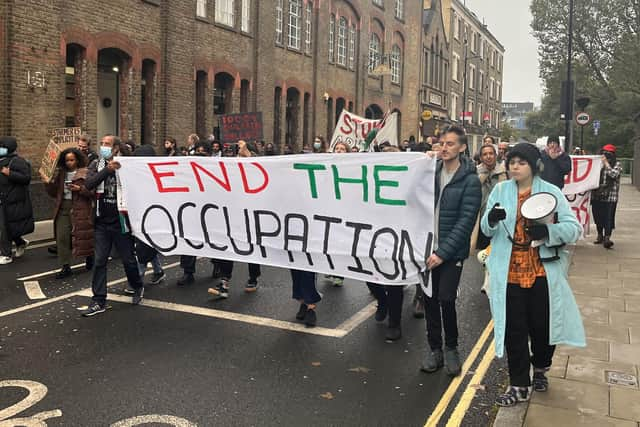Sober and rigorous evaluation of history needed to understand the current Israel-Gaza conflict - Michael Meadowcroft
Attacks on civilians are never, ever justified. The Hamas action cannot be justified or excused but it festered over many years in the history of Palestine and could be predicted - not in the failure of Israeli intelligence in the days before October 7, but in the inevitable consequences of the history of the region. Israeli politicians, alas, have been the Bourbons of the 20th century, learning nothing and forgetting nothing.
Setting aside the earlier 45 years of Israeli attacks on and expulsion of Palestinians from the traditional Palestine after 1947, with today some 700,000 settlers on the West Bank, the lessons from the Oslo accords of 1993 onwards were neither understood nor appreciated by Israel.
Advertisement
Hide AdAdvertisement
Hide AdThe Palestine Liberation Organisation (PLO) and its main component party, Fatah, had been recognised as the key representatives of the Palestinians for many years but had singularly failed to achieve their liberation.


This was particularly keenly felt in Gaza and by 1987 the more militant Hamas was formed, aiming to rectify that failure. It led the intifadas against Israel in 1989 and 2003. The PLO was Israel’s interlocutor in the 1993 Oslo accords negotiations but gained only limited success.
Hamas then won the 2006 legislative election in Gaza. The lesson was clear: a failure to settle with one organisation inevitably leads to it being replaced by a more militant body. Israel’s failure to give sufficient ground to the PLO in 1994 thus led to Hamas’ takeover of Gaza. From my knowledge of them, Palestinian electors certainly did not vote for the atrocities of October 7.
Israel’s historic repression of the Palestinians, including confining over two million of them within the Gaza Strip, roughly the size of the Isle of Wight, in primitive conditions and without freedom of movement apart from a few individuals given work permits, and with rigid control of the borders, the sea and the air, inevitably built up frustration and Hamas began to fire rockets into southern Israel.
Advertisement
Hide AdAdvertisement
Hide AdThe IDF began an aerial bombardment on December 27, 2008, followed by a ground invasion. By the ending of the war on January 18 around 1,400 Palestinians (and 13 Israelis) had been killed. The horror of this military operation, intended as a deterrent to future Palestinian action, singularly failed to achieve that aim. By 2014, Israel felt it necessary to launch another aerial bombardment and ground invasion resulting in over 2,000 deaths, the majority of them being residents of Gaza. That attempt at deterrence has manifestly also failed.
These attacks on Gaza had the opposite effect. The aerial bombardments carried out with complete impunity and killing hundreds of innocent civilians, simply made Hamas even more determined to attack Israel.
The failure of deterrence by force was vividly demonstrated in the appalling attacks of October 7. Having failed to learn the lessons of 2008 and 2014, Israel is simply repeating the fundamental mistake of relying on huge aerial bombardment and indiscriminate killing of Palestinians in Gaza in the fond hope that it deters. It will not and, what is more, if it were to succeed in destroying Hamas as an operational force, the likelihood is that even more extreme organisations will replace it, such as Hezbollah and Islamic Jihad. Failed liberation organisations are always replaced by more extreme versions and never by more pacific bodies.
None of this is in any way to excuse or to justify Hamas’ actions but rather to draw attention to cause and effect. The incremental increases in the controls and constraints on Palestinians on the West Bank, with checkpoints, being walled in, having crops destroyed and water sequestered, all breed antagonism and frustration.
Advertisement
Hide AdAdvertisement
Hide AdNot surprisingly this eventually boils over into increased militancy, particularly amongst younger males, often with lethal consequences. It certainly does not lead to peace and tranquillity and yet the Israeli authorities continue to rely on repression. If one tightens down all the valves on a boiler it will eventually explode. As it did on October 7.
One immediate effect of the events of October 7 was to bring out a unique global outpouring of sympathy and support for Israel, which its continued lethal actions in Gaza threaten to undermine.
The urgent call today is not just an humanitarian plea, valid though that is, but also for a sober and rigorous evaluation of history and of the evident cause and effect. Revenge needs to be replaced by reason and logic as essential components of an eventual peaceful Israel and Palestine. ‘Never again’ has to look for different solutions.
Michael Meadowcroft is the former Liberal MP for Leeds West.